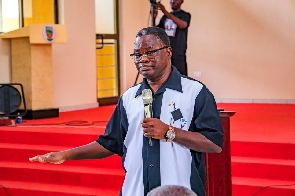"The belief in witchcraft in which people have the psychic power to fly, suck blood, or cause infertility, impotency, loss of property, loss of job, sickness, death etc., has no basis in the Bible." That's according to Prof. John Azumah, the Executive Director of the Sanneh Institute of the University of Ghana.
He was speaking at a public lecture organized by the Department of Theology and Ministry of Heritage Christian College, a university in Amasaman-Accra.
Speaking on the theme, "Witchcraft and Christian Witness: A Biblical Perspective," the Visiting Professor at Yale Divinity School and Presidential Visiting Fellow at Yale University noted that the African concept of witchcraft which has led to the lynching of several perceived witches is a deadly misunderstanding.
"The Hebrew and Greek texts of Exodus 22:18 ["Thou shall not suffer a witch to live"] and the Hebrew root word kashaph and Greek word pharmakous, properly understood, is denouncing the occultic use of magic for the purposes of witchcraft and sorcery."
He said the concept of witchcraft supposes that witches have the powers to fly at night, seek out victims, make people barren or impotent, kill others and do other terrible things which in fact are not so in the Bible. He stated that this idea of witchcraft is a deadly misunderstanding of the Bible concept of sorcery.
Thus, the distorted ideas of witchcraft should be understood in terms of sorcery (or magic) and demon possession.
"The Bible talks about demons and demon possession, which is always confused with witchcraft. Demon possessed persons in the Bible are not witches, but victims."
He said although the King James Version of the Bible translated Ex 22:18 as "Thou shall not suffer a witch to live" all modern translations of the Bible such as the New King James Version, Revised Standard Version, New International Version, the Amplified Bible among others have rendered "witch" as "sorceress" and "witchcraft as "sorcery" in keeping with the Hebrew and Greek root words.
Prof. John Azumah concluded that the practice of sorcery as spoken of in the Bible also exists in the African society but is different from what many have come to understand as witchcraft.
Prof. Azumah cited Ekpo, a Nigerian Old Testament scholar who described the practices decried in the Bible as part of occultic practices, “The practitioners were part of the royal council and entourage that provided counsel and guidance to administrative policies and jurisdiction for both national and international politics of their time. They do consultancy services and charge for their services (cf. 1 Sam 28). They were paid from the treasury of the State for their services (Exod 7; Dan 1-4). They were often trained and given professional tutorials and qualify for their employment after being duly examined and found qualified and certified (Dan 1-2).”
In other words, neither mekhashepha nor pharmakeia were flying in the night, sucking people's blood or eating souls. They were paid professionals."
Prof. John Azumah said his study of the concept of witchcraft has led him to interview alleged witches at witch camps in Northern Ghana, where he hails from, witch doctors and practioners of sorcery or magic, Bible translators and scholars on the subject. He says much of what has caused the deaths of innocent victims, mostly women, could have been prevented if a proper understanding of the Bible were applied.
The public lecture attracted students and faculty of Heritage Christian College, Heritage Bible Institute and a cross-section of the general public. The Dean of the School of Human Development at the Heritage Christian College, Prof. Benjamin Abotchie Ntreh said the public lecture is one of the avenues the school is using to educate the public on various topics of concern in the society.
The Head of Department of Theology and Ministry, Dr. Nathan Bills was optimistic that the lecture had served its purpose of opening up discussions on the subject of witchcraft and pledged that the conversation would continue.
Press Releases of Friday, 26 May 2023
Source: Heritage Christian College













